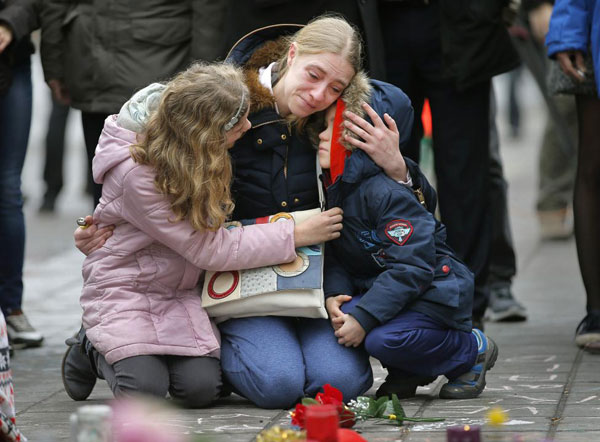Uneasy times as Belgium mourns the dead after terror attacks
By Fu Jing in Brussels (chinadaily.com.cn) Updated: 2016-03-23 23:27 |
|
A woman consoles her children at a street memorial following the bomb attacks in Brussels, Belgium, March 23, 2016. [Photo/Agencies] |
Belgium's capital Brussels always boasts of being the heart of European Union. First, geographically, it is an ideal European gateway and second, it serves as headquarters of European integration.
Normally, thousands of international journalists gather in the capital's zone where many European institutions are located, gathering stories on the bargaining processes of the project to maintain Europe peace.
But the atmosphere here is different today.
On the day after the explosive attacks at Maelbeek metro station, a stone's-throw away from the European Commission building, and Brussels airport at Zaventem, journalists assembled there to cover the one minute of silence for those victims of the bloody disasters.
Today, this area is gradually returning to normal. Shops, restaurants, coffee bars and office buildings are open after a day of closures. But the tunnel, where the European Commission and the European Council sit respectively on either side, remains closed.
And the main road beside the attacked metro station is not accessible. Police, journalists and rescue workers are busy working around it. It is grey this morning in Brussels and so it was yesterday. About one kilometer of the street leading downtown was blocked, with no access to traffic and people.
It reminds me of the seriousness of the explosions and in some way, this is a serious "heart attack" of European Union.
Near the European Council building, I found a bunch of flowers with "No Fear" written on the card. This is encouraging to find at a time when Belgians are in deep sorrow. And it is high time to spread courage, love, sympathy and share sorrow, instead of spreading fear.
However, suddenly, I realized this is my third time to report mourning in Europe since the beginning of last year.
On the night of 7th January 2015, when my newspaper was organizing a New Year seminar in Brussels, gunmen attacked the Charlie Hebdo magazine's building in Paris. We held a moment of mourning with seminar participants. Then in late November when the G20 summit was being held in Turkey, I was reporting the leaders' one-minute of act of silence for more than 130 people who lost their lives in another Paris terror attack.
Since then, European countries have tightened security measures while at the same time struggling against a stream of migrants from the Middle East heading across the EU's borders. Belgium has raised its security alert level and the soldiers and police patrol frequently in downtown Brussels and the European Union's buildings.
But they failed to prevent the attacks on Brussels on March 22. So Wednesday's period of mourning became the third one I covered in Europe in about a year. I really wish there will be no more and I really wish there will be no hatred and conflict, just peace and love.
However, if the European authorities don't take an iron-fist approach to illegal immigrants, find better ways to deal with relations with Middle East countries and fix the loopholes of security control, it is really hard to say what will happen.
This time, the terror attacks happened inside the airport's departure building and inside the metro. To be honest, when even this country was on the highest security alert level in November and December, everybody had free access, without security check, to come and go.
This is obviously a loophole. Some people say Europeans are not willing to sacrifice freedom of movement. But what happened on Tuesday was bloody and costly.
It had already happened before and the most important thing is what Europeans need to learn from such tragedy.
In the previous ten years, Union integration has suffered from the tremendous challenges of the Greek sovereign debt crisis, economic recession, the crisis in Ukraine, immigrants, policies towards North Africa and West Asia, rising terrorism attacks and various threatened exits by Greece and UK at least.
It is high time for European politicians to wake up and face squarely these problems, and they need to know that the ordinary people are not satisfied with the status quo.
One Chinese businessman sent me a message saying it is not only developing countries that have security risks, but also in the developed world. Chinese people need to be careful when investing overseas.
In front of European Commission building on Wednesday, I met a Belgian musician, with her lovely dog following her. When I asked her how she felt, she replied, in tears, "I am sad and very sad."
And asked if she fears that this will happen again, she said: "I don't know."
This is telling. And the politicians and governments in Europe should convince us: Belgium is safe and so is Europe. Only in this way, trust from the citizens can be gained.
To contact the reporter: fujing@chinadaily.com.cn

I’ve lived in China for quite a considerable time including my graduate school years, travelled and worked in a few cities and still choose my destination taking into consideration the density of smog or PM2.5 particulate matter in the region.











